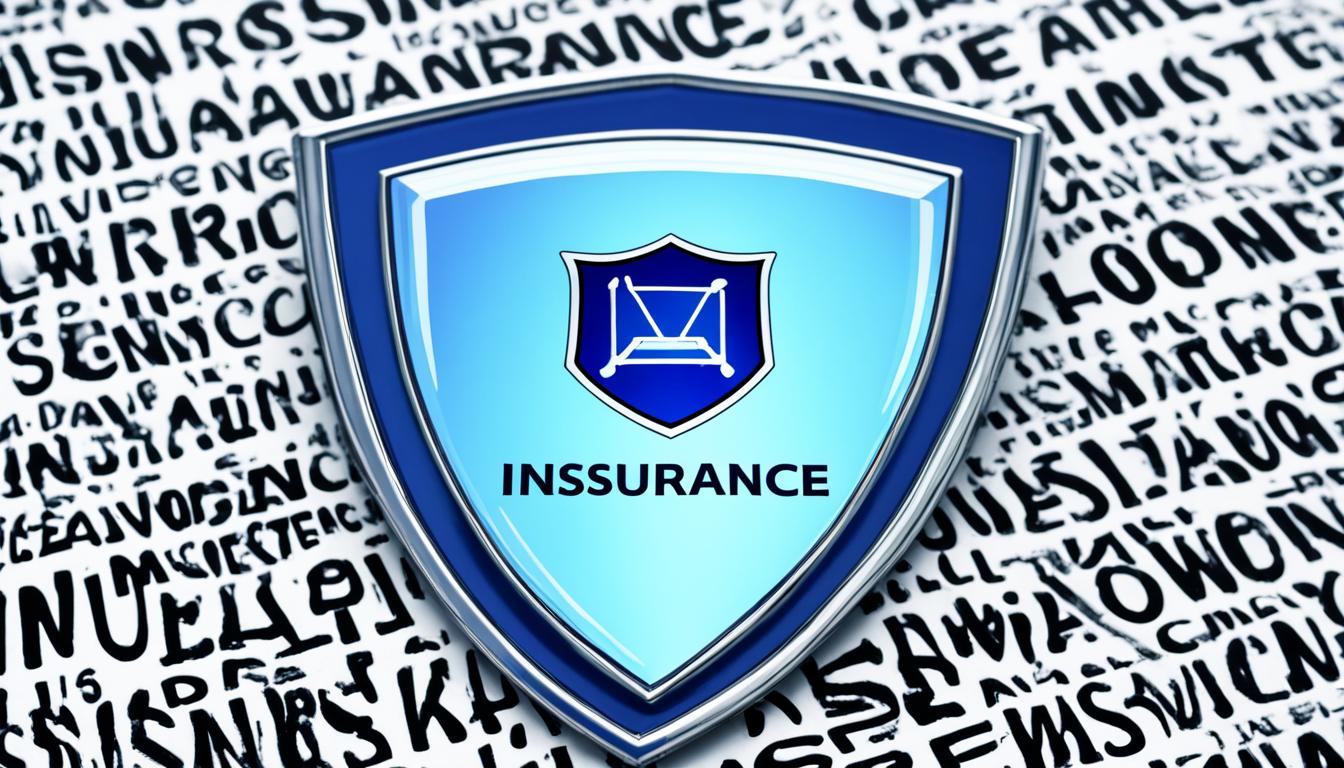Welcome to our comprehensive guide on business insurance coverage choices and types of business insurance. As a small business owner, it is crucial to protect your enterprise from unexpected events and ensure its financial stability. Business insurance provides the necessary financial protection, fulfills legal requirements, enhances credibility and trust, protects employees, and ensures business continuity.
With the right business insurance coverage, you can safeguard your business against potential risks, such as accidents, property damage, liability claims, and more. Understanding the importance of small business insurance will help you make informed decisions that align with your specific needs and industry requirements.
Key Takeaways:
- Small business insurance is essential for protecting your enterprise and ensuring financial stability.
- Business insurance provides financial protection, fulfills legal requirements, enhances credibility, protects employees, and ensures business continuity.
- To select the right coverage, identify risks, assess business needs, consult insurance professionals, bundle policies, and regularly review and update coverage.
- Property insurance is crucial for protecting physical assets, and coverage needs should be determined based on individual business requirements.
- Consider unique insurance options tailored to your industry and specific circumstances to fully protect your business.
Importance of Small Business Insurance
Small business insurance plays a crucial role in protecting your business and ensuring its financial stability. By providing financial protection, insurance shields your business from the potentially crippling costs of accidents, property damage, liability claims, and other unforeseen events. This safety net offers peace of mind and allows you to focus on growing your business.
Moreover, business insurance fulfills legal requirements, ensuring that your operations comply with the necessary regulations. For example, workers’ compensation insurance is mandatory in many states, providing coverage for employees injured on the job. By meeting these legal obligations, your business demonstrates its commitment to professionalism and responsibility.
Having comprehensive insurance coverage enhances your business’s credibility and trustworthiness. It gives your stakeholders, including clients, customers, and partners, confidence in your ability to handle unforeseen circumstances. This credibility not only strengthens your existing relationships but also attracts new opportunities for growth and collaboration.
Another critical aspect of small business insurance is employee protection. By investing in workers’ compensation insurance, you ensure that your employees are financially protected in the event of workplace injuries or illnesses. This coverage not only demonstrates your commitment to their well-being but also fosters a positive work environment and encourages employee loyalty.
Business insurance also plays a vital role in business continuity. Disasters or unexpected events can disrupt operations and cause significant financial losses. With the right insurance coverage, your business can recover more quickly and efficiently, minimizing downtime and restoring operations to normalcy.
For example, imagine a small retail store that experiences a fire. Thanks to their property insurance coverage, they can swiftly repair or replace damaged inventory, equipment, and premises, allowing them to resume business operations without excessive delays.
In conclusion, small business insurance is a vital investment, providing financial protection, fulfilling legal requirements, enhancing credibility and trust, protecting employees, and ensuring business continuity. By safeguarding your business against potential risks, you set the foundation for long-term success and stability. So, don’t wait any longer – take the necessary steps to secure your business’s future with the right insurance coverage.
Selecting the Right Small Business Insurance Coverage
When it comes to protecting your small business, selecting the right insurance coverage is vital. By identifying risks, assessing your business needs, and consulting with an insurance professional, you can ensure that you have the appropriate coverage to safeguard your business’s financial stability. Here are some key steps to consider:
Identifying Risks
Begin by identifying the specific risks that your business may face. These risks can include property damage, liability claims, theft, data breaches, and natural disasters. By understanding these potential threats, you can better prepare for them through comprehensive insurance coverage.
Assessing Business Needs
Every business is unique, with its own set of needs and priorities. Take the time to assess your business’s specific requirements when it comes to insurance coverage. Consider factors such as your industry, location, assets, and operations to determine the types and levels of coverage that are most appropriate for your business.
Consulting an Insurance Professional
When navigating the complexities of business insurance, it’s often beneficial to consult with an insurance professional. These experts can provide valuable insights and guidance based on their industry knowledge and experience. They can help you understand the intricacies of different policies, bundle coverage options, and optimize your insurance plan.
Bundling Policies for Cost Savings
Another effective strategy is to bundle multiple insurance policies with the same provider. By consolidating your coverage, you can often enjoy cost savings and simplified administration. This approach allows you to address multiple risks under a single policy, reducing the need for separate premiums and paperwork.
Understanding Policy Limits and Deductibles
As you review insurance policies, it’s essential to understand your policy’s limits and deductibles. Policy limits refer to the maximum amount an insurer will pay for a covered claim. Deductibles, on the other hand, represent the portion of a claim that you must pay out of pocket before insurance coverage kicks in. By understanding these details, you can manage your premiums and coverage effectively.
Regularly Reviewing and Updating Coverage
Business needs evolve over time, and so should your insurance coverage. It’s crucial to regularly review and update your policies to ensure that they align with your current business requirements. Changes such as expansions, acquisitions, or new ventures may necessitate adjustments to your coverage. By keeping your insurance up-to-date, you can maintain the financial stability and peace of mind your business deserves.

By following these steps, you can select the right small business insurance coverage that adequately mitigates risks and protects your business. Remember to regularly review and update your coverage to keep pace with your evolving business needs. Insurance is a fundamental tool for safeguarding your business’s financial stability and ensuring a prosperous future.
Customizing Property Insurance for Your Business
When it comes to protecting your business, property insurance plays a critical role in safeguarding your physical assets. Whether it’s buildings, equipment, inventory, leased premises, or machinery, property insurance provides coverage for a wide range of property types.
Before selecting a property insurance policy, it’s important to determine your coverage needs. Conducting a comprehensive inventory of your business property allows you to identify the types of property you have and the value associated with each. This inventory will serve as a valuable tool in determining the appropriate coverage for your business.
Basic property insurance typically covers losses resulting from fire or lightning. This basic coverage ensures that your business is protected against these common perils. However, to ensure comprehensive protection, you may want to consider a standard property insurance policy.
Standard property insurance goes beyond the basic coverage and includes additional perils such as floods, windstorms, hail, earthquakes, and more. These perils can pose a significant risk to your business, especially if you operate in an area prone to natural disasters. By opting for standard property insurance, you can have peace of mind knowing that your business is protected against a broader range of risks.
Keep in mind that the specific coverage options and policy terms may vary depending on the insurance provider and the region in which your business operates. It’s crucial to thoroughly review and understand the terms and conditions of the property insurance policy before making a final decision.
Comparing Basic Property Insurance and Standard Property Insurance
| Basic Property Insurance | Standard Property Insurance | |
|---|---|---|
| Coverage | Fire and lightning | Fire, lightning, floods, windstorms, hail, earthquakes, and more |
| Perils Covered | Basic perils | Additional perils |
| Business Protection | Limited coverage | Comprehensive coverage |
Whether you choose basic or standard property insurance, the key is to ensure that your coverage aligns with your business’s unique needs and risk profile. By customizing your property insurance, you can protect your business assets, minimize financial losses, and maintain the continuity of your operations.

How Much Business Insurance Coverage Do You Need?
When it comes to protecting your business, having the right insurance coverage is essential. Some types of insurance are compulsory by law, ensuring compliance and mitigating financial risks. For instance, if you have employees, **employers’ liability insurance** is compulsory to provide financial protection in the event of workplace accidents or illnesses. Similarly, if your business utilizes vehicles, **third party motor insurance** is mandatory to cover potential damages or injuries caused by your vehicles to third parties.
In addition to the compulsory insurances, you should also consider additional coverages based on your business’s specific needs. Here are some options worth exploring:
- Professional Indemnity Insurance: This coverage protects businesses that offer professional or expert advice, services, or consultancy. It safeguards your business against claims of professional negligence, errors, or omissions that could result in financial losses for clients.
- Public and Product Liability Insurance: This crucial coverage protects your business from legal liabilities arising from any accidents or injuries to third parties due to the use of your products or services. It offers financial support in case of lawsuits, medical expenses, or property damage claims.
- Tax Enquiry and Legal Expenses Insurance: This coverage helps offset the costs of professional fees incurred during tax-related disputes and legal proceedings. It means you can focus on running your business instead of worrying about mounting legal expenses.
- Building and Contents Insurance: If you own or lease a business property, having **building and contents insurance** is vital. It covers damages to the physical structure of the building as well as the contents, such as furniture, stock, and equipment, caused by fire, theft, vandalism, or natural disasters.
- Personal Accident and Sickness Insurance: This type of coverage provides financial protection for business owners or key employees in the event of an accident or sickness that prevents them from working. It offers financial support in the form of a regular income replacement or a lump sum payout.
By carefully assessing your business’s specific needs and considering the compulsory insurance requirements along with additional coverages, you can ensure comprehensive protection for your business. Consulting with an insurance professional can help you navigate through the available options and choose the right mix of coverages to safeguard your business’s financial stability. Remember to review and update your insurance coverage regularly as your business evolves to ensure continuous protection.

Tailored Insurance for Your Unique Business Needs
Every business has unique insurance needs. It’s important to consider tailored insurance options based on your industry and specific circumstances. By customizing your insurance coverage, you can ensure that your business is adequately protected against potential risks and unexpected events.
Small Motor Fleet Coverage
If you have a small motor fleet, it’s crucial to have the right insurance coverage. Consider options such as small motor fleet coverage, which provides protection for your fleet of vehicles. This type of coverage can include comprehensive and collision insurance, liability coverage, and even coverage for new car replacement. By tailoring your insurance to your motor fleet, you can have peace of mind knowing that your vehicles and drivers are fully protected.
Pub Owner Coverage
As a pub owner, your business faces unique risks. It’s important to have coverage that specifically addresses these risks. Pub owner coverage can include protection for potential loss of license, liability insurance for alcohol-related incidents, and coverage for property damage and theft. By tailoring your insurance to your pub business, you can protect your establishment and ensure the continuity of your operations.
Property Owner Coverage
If you own properties, whether residential or commercial, tailored insurance is essential. Property owner coverage can provide protection for your rental properties, including coverage for loss of rental income, property damage, liability claims, and more. By customizing your insurance coverage to address the unique needs of property ownership, you can safeguard your investments and mitigate financial risks.
When selecting tailored insurance options, consult with insurance professionals who specialize in your industry. They can help you assess the specific risks you face and recommend the right coverage options to meet your needs. Regularly reviewing and updating your insurance coverage is also important to ensure ongoing protection as your business evolves.

By choosing tailored insurance coverage, such as small motor fleet coverage, pub owner coverage, and property owner coverage, you can have peace of mind knowing that your unique business needs are fully protected. Don’t leave your business vulnerable to risks, customize your insurance to ensure comprehensive coverage.
| Insurance Type | Coverage |
|---|---|
| Small Motor Fleet Coverage | Comprehensive and collision insurance, liability coverage, new car replacement coverage |
| Pub Owner Coverage | Loss of license protection, liability insurance, property damage and theft coverage |
| Property Owner Coverage | Rental income loss coverage, property damage coverage, liability protection |
Conclusion
In conclusion, business insurance is an essential tool for safeguarding your business and ensuring its financial stability. By understanding the importance of business insurance, you can protect your enterprise from unexpected risks and focus on its success. Selecting the right coverage based on your business needs, consulting with insurance professionals, and regularly reviewing and updating your policies will help ensure that your business is well protected.
Investing in the protection of your business today is crucial for securing a prosperous future. Business insurance provides the necessary financial security to navigate challenges, such as accidents, property damage, liability claims, and more. With the right coverage, you can have peace of mind knowing that your business is shielded against potential risks and losses.
Don’t overlook the significance of business insurance when it comes to the well-being of your enterprise. Take proactive steps to safeguard your business and ensure its long-term financial stability. With comprehensive insurance coverage, you can focus on growing your business and seizing new opportunities, knowing that you have a safety net to fall back on when needed.




No comments! Be the first commenter?